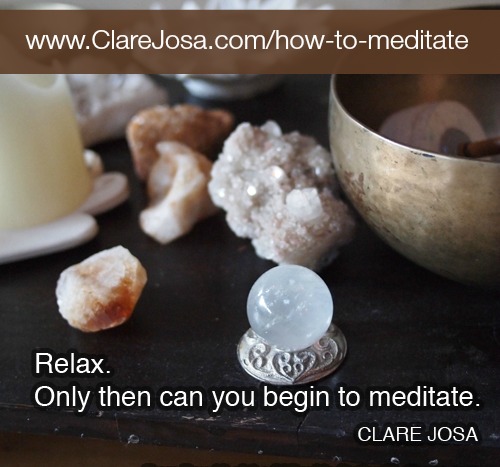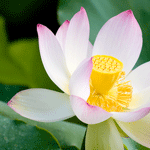Do you ever find you’re too tired or stressed to meditate?
Back in the days when I was training to become a meditation teacher, I was on the course with my husband Peter. He was famous for his ‘nodding dog’ impressions. You would get 15 to 20 minutes into a meditation technique and suddenly there would be a nearly-silent giggle from the tutor at the front of the room, as they saw him nodding away, falling asleep. As usual, he was too tired to meditate.
Now that might seem strange, because we might wonder, “It’s meditation: I am sitting still; I’m relaxing; I’ve got my eyes closed, how can I stay awake?”. . . But actually meditation is about relaxed alertness. That’s the difference between deep relaxation – which is intending solely to relax you – and meditation, which is about relaxation with focus and concentration. And it reminded me of my meditation mentor, and a story he once told.
A severely stressed executive came to him, wanting to learn to meditate. It didn’t take long to see that the guy couldn’t sit still: fingers twitching, body fidgeting, fast upper-chest breathing, super-fast talking… You could see his mind was racing and the bags under his eyes told tales of stress-filled sleepless nights. And, once he got to meditate, he would pretty much instantly fall asleep. If anyone ever needed to tap into the de-stressing benefits of deep relaxation, this guy was a prime candidate.
But my mentor turned him away.
“Why on earth would you do that?” we asked him; a stunned class of trainee teachers. He smiled gently as he explained that to be able to meditate there are three stages you have to go through.
Meditation is about relaxation, acceptance and then focused concentration.
Until you can relax, you can’t meditate.
If you find it really hard to sit still, if you’re finding it really hard to accept your mind, if you’re finding it impossible to manage those pesky thoughts, it could be that what you need most right now is actually deep relaxation and not meditation. It takes a lot of energy to manage and accept your thoughts. It takes energy to concentrate and focus. That’s why we make more mistakes, for example, when writing a message if we’re tired, than if we’re feeling refreshed. So feeling too tired to be able to meditate effectively is a common problem.
Fortunately, there’s a simple solution: no, it’s not sleep! It’s deep relaxation.
Doing a 20 minute progressive tense and release deep relaxation every evening, even just for a week, can transform your experience of life.
I’m not exaggerating!
It can have the most profound effect on your body’s production of adrenalin and other stress hormones, allowing you to relax and recharge your batteries.
Once you are able to relax, then you will find meditation MUCH easier. It might be that you need to go and spend a month doing that, before you come back and maybe re-start the 28 Day Meditation Challenge (I’m not trying to get rid of you!). Or, if you are prepared to carve out the time you could do both at once.
Deep relaxation is absolutely key to our health, especially when we are running on adrenalin. This constant, low-level stress means that – for many of us – our adrenal glands are nearly empty and our mind and body are close to burn-out. We survive on a diet of stimulants – usually caffeine, sugary foods and high carbohydrate foods, to give us the ‘boost’ we need to keep going. But we’re paying a big price.
Aside: if this is resonating for you, you might want to check out the best book I have ever found on dealing with long-term exhaustion and adrenal issues. It’s called ‘Adrenal Fatigue’ by Jim Wilson and reading it changed my life – despite the fact I thought that, as a Meditation Teacher and NLP Trainer, I already knew all there was to know about dealing with stress…
The other thing that can make a huge difference to being able to relax is your posture – as I cover in detail in my online course “How To Meditate“. If your back posture is activating your sympathetic nervous system (fight / flight) without also triggering your parasympathetic relaxation response, you could end up too tense and ‘fired-up’ to be able to meditate effectively.
Watch out for your emotions
Often, when starting a new meditation or mindfulness habit, we have been feeling tired for a very long time. Our monkey mind drowns out the tiredness with its constant commentary. When we learn how to stop and rest, the old tiredness and even long-suppressed emotions can come out to play. If you’re feeling very tired, do a deep relaxation. If you’re feeling emotional, there are some great techniques later in the 28 Day Meditation Challenge.
So what happened to the super-stressed executive?
He went away and spent a few months working on deep relaxation and dealing with his stress habits. When he came back, ready to meditate, he got fast results. His body was able to relax easily, which made it much easier to accept his environment, his thoughts and his physical world. And then the focused concentration was much simpler for him.
And, as for Peter?
You can always tell when he’s too tired to meditate, because his now-infamous nodding dog returns. It’s his personal tip-off that he’s been over-doing things and needs to shift down a gear for a while.
So my invitation to you today is to think about how you are living, how your body feels, how your mind feels and to see whether deep relaxation and de-stressing might be what you’re secretly craving right now.
Want To Do A Guided Deep Relaxation Today?
There are plenty of good deep relaxation CDs / MP3s out there. And as a bonus, in case you need it, I have included one on for students on my online programme: “How To Meditate“. I hope you enjoy it! If you’d like to join us, here’s where you can get started:
www.ClareJosa.com/how-to-meditate
Affirmation:
I choose to look after my energy levels.
With love, Namaste,
![]()




